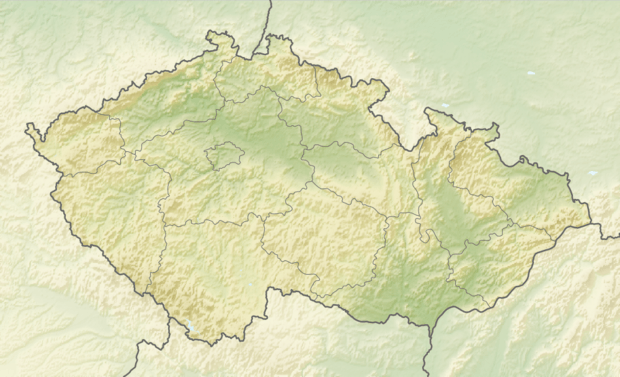Benecko
Benecko (German: Benetzko) is a municipality and village in Semily District in the Liberec Region of the Czech Republic. It has about 1,100 inhabitants.
Benecko | |
|---|---|
_Panorama_(2006-12-24).jpg) Panorama of Benecko | |
 Flag  Coat of arms | |
 Benecko Location in the Czech Republic | |
| Coordinates: 50°39′59″N 15°32′54″E | |
| Country | |
| Region | Liberec |
| District | Semily |
| First mentioned | 1628 |
| Area | |
| • Total | 16.52 km2 (6.38 sq mi) |
| Elevation | 682 m (2,238 ft) |
| Population (2020-01-01[1]) | |
| • Total | 1,096 |
| • Density | 66/km2 (170/sq mi) |
| Time zone | UTC+1 (CET) |
| • Summer (DST) | UTC+2 (CEST) |
| Postal code | 512 37, 514 01 |
| Website | www |
History
The area has been site to multiple settlements over time. The first recorded original historical center of habitation was Horní Štěpanice, a small settlement established near the castle Štěpanice. The first reference to the area is dated in year 1304, when the castle was founded by Jan Valdštejn.[2] The latest archaeological findings point to older occupation of the site in 1254 by Jindřich of Valdštejn. Horní Štěpánice had town status until 1524 when the castle was abandoned.[3]
Benecko is firstly mentioned in year 1628 as "Bennešsko", meaning the residency of Beneš. The name is also said to be derived from a local legend about a hermit of Benedikt order, whose hermitage was located near Jindra rock near the site of the modern Chapel of Saint Hubert.[4]
People migrated to parts of municipality in the 17th and 18th century and built an economy based on farming, hand weaving and the manufacture of jewellery. In the nineteenth century, tourism was developed, with rich tourists bringing economic wealth and new industries to the area. This development was interrupted by the World War II. In second half of twentieth century, most of businesses were nationalized and tourism lessened in importance. The next wave of prosperity started after 1989 with restitution of properties following the Velvet Revolution.
Economy
Economic activities of local population were changed many times. Initially, the economy was based on farming and mining. After the coal reserves were exhausted, the people turned to industries like wood mining, glassblowing and textile processing. The current economy of Benecko is mostly oriented towards tourism and related activities.[5] The municipality to home to many hotels, penziones, private holiday accommodations, ski schools and equipment rental, with little industry, including the small company Delfi in Dolní Štěpanice.
Transport
Benecko has bus connection with Vrchlabí, Jilemnice and on Friday and Saturday with Prague. In the main tourist season there are also cyclobuses between Pec pod Sněžkou and Harrachov.
Culture
Despite its remoteness, Benecko has a rich cultural life with amateur theater and musical associations.[4]
Sport
In the 1960s, the first ski lifts were built in Benecko, the 328-metre (1,076-foot) long Chrudim and 750-metre (2,460-foot) long Kejnos that was replaced in 2006 by modern four-seat ski lift.[4] There are currently 10 ski lifts from 115 to 800 metres (377 to 2,625 feet) long, mostly for beginners and two skiparks for intermediate.
In Benecko there are two football teams, which play in both men and women divisions.
Sights
- Ruins of Valdštejn castle in Horní Štěpanice
- Parish Church of Holy Trinity in Horní Štěpanice
- Hronova cottage number 67
References
- "Population of Municipalities – 1 January 2020". Czech Statistical Office. 2020-04-30.
- Kocourek, Jaroslav (2002). Český atlas. Severní Čechy (in Czech). Prague: Freytag & Berndt. p. 16.
- David, Petr; et al. (2002). 888 hradů, zámků, tvrzí České republiky (in Czech). Prague: Soukup & David. p. 280.
- "Obec Benecko". Benecko (in Czech). Retrieved 10 December 2017.
- Schüttig, Frank (1999). Das Riesengebirge entdecken: Rübezahls Land an der tschechisch-polnischen Grenze (in German). Berlin: Trescher. p. 141.
External links
- Official website
- Benecko tourist portal
